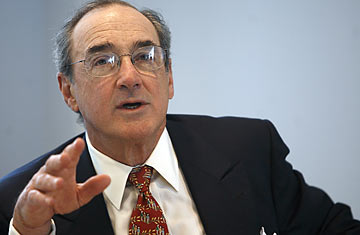
Robert Toll, chairman and chief executive officer of Toll Brothers Inc.
A surge in insider selling at luxury homebuilder Toll Brothers Inc. in the past two weeks is raising red flags from jittery investors who nervously wonder if Toll and other homebuilding stocks may be overpriced and heading for a fall.
Since Sept. 8, chairman and chief executive Robert Toll has unloaded more than 4.3 million shares and pocketed at least $82.5 million in pretax net proceeds, according to filings with the Securities and Exchange Commission. At least two other insiders — director Bruce Toll and president Zvi Barzilay — have also been selling: Bruce Toll sold 352,433 shares, netting proceeds of about $7.5 million, while Barzilay dumped 200,000 shares for net proceeds of about $3.5 million, the filings reported. In some but not all cases, the insiders sold shares they had acquired through stock options that were to expire on Dec. 20. (The cost of exercising the options was netted out of the proceeds figures.)
It was Robert Toll's sell-off that rattled analysts and investors the most, as many recall how Toll in 2005 sold off large blocks of shares in his company just as the homebuilding sector was peaking. Toll is viewed as a seasoned and savvy executive with an extraordinary knack for recognizing trends early on.
"I think the [homebuilding] stocks have run up too much, so it's not surprising to me what he's doing," says Alex Barron, a senior research analyst in the El Paso, Texas, office of Agency Trading Group. "I think there are still significant headwinds facing the housing market," he says, such as rising unemployment, potentially higher interest rates and an expected increase in foreclosures.
Robert Toll "has been an astute investor and has opportunistically sold stock" in the past, says Bob Curran, managing director at Fitch Ratings. "Many have suggested that they think the [homebuilding] stocks might be ahead of themselves."
Homebuilding stocks have been on a tear, climbing 168% on average from their trough in March, outpacing the S&P 500's 57% rise during the same period, says Barclays Capital analyst Megan Talbott McGrath, who tracks eight major builders. If Hovnanian Enterprises, whose stock has soared 645% from its trough, is excluded, builders have rallied 89% on average since March, she says.
The rally came after certain housing data, such as housing starts, home sales and the Case-Shiller home price index, started to show signs of month-over-month improvement for the first time since 2006 and homebuilders reported fewer cancellations and write-downs. Also, the federal tax credit for first-time buyers contributed to the improved demand for builders that make entry-level homes.
All this led investors to believe a bottom had been reached, says Curran. Many investors may wrongly think the housing sector will see the normal trajectory off the bottom, but that isn't the case, he says. "We still have high foreclosures that will persist into next year, high inventory, an unstable economy and high levels of unemployment" that will prevent the sector from rebounding quickly, he says.
Despite the rally, homebuilding stocks remain far off their July 2005 highs. They lost more than 80% of their value on average from July 2005 to their trough in March 2009, noted Keefe Bruyette & Woods analyst Bose George.
Still, many analysts believe the 2009 stock run-up among homebuilders has gotten ahead of the sector's pending recovery. "The stocks have gone too far, too fast," says Rob Stevenson, managing director at Fox-Pitt Cochran Caronia. Stevenson isn't surprised by the insider selling at Toll Brothers: "We think the group has gotten overvalued and that a pullback is likely." After all, he notes, "they're still not producing a profit."
Virtually all of the builders, with the exception of NVR Inc., are expected to continue posting losses through 2010 and are not expected to report a significant rebound in earnings and home prices until 2011 or possibly 2012 at the earliest, says George. Also, the federal tax credit, if not extended, will expire on Nov. 30, which could slow the housing recovery further.
Despite Toll's decision to sell off shares, he still holds 14.5 million shares in the company either directly or indirectly — about 9% of the shares outstanding. "So his interest in the company and alignment with shareholder interests is still extremely strong," says Talbott McGrath. However, she believes the insider selling is contributing to the stock's underperforming many of its peers in the homebuilding sector.
"I think investors are paying attention to that, and it is hurting the stock," she says, noting that Toll's shares are up only 45% from their March peak.
Robert Toll was not immediately available to comment, but a spokeswoman, Kira McCarron, says his stock sales are normally done for "diversification" reasons, to lower risk in his personal investment portfolio.
